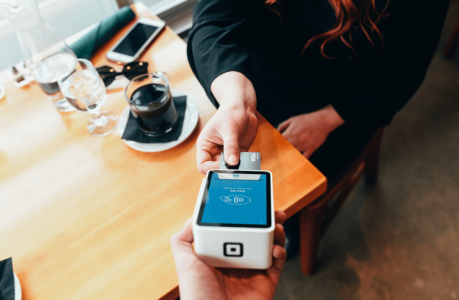Electronic payments are taking over: Is cash no longer king?
- Replies 80
In a world where convenience is king, it's no surprise that Aussies are ditching cash in favour of quick and easy tap-and-go payments and online transfers.
In fact, cash payments have reportedly plummeted to a mere 13% of all transactions – a trend that shows no signs of slowing down.
But with this shift towards cashless methods comes a new set of challenges – namely, ensuring the safety and security of electronic payments.
At the recent Australian Financial Review Banking Summit, Ellis Connolly, the Head of Payments Policy at the Reserve Bank of Australia, highlighted the need to protect electronic payments against potential cyber threats.
'The dominance of cards and the consumer shift to mobile devices raise some important issues within the RBA's mandate,' he said.
While Connolly emphasised the importance of safety, he failed to address the very real risk of cyber sabotage, leaving many wondering just how secure their electronic payments really are.

As we move towards a cashless society, it's more important than ever to consider the potential risks and take steps to safeguard our financial transactions.
Imagine a world where every EFTPOS terminal in the entire country was suddenly shut down. It may sound like the stuff of nightmares, but according to Cyber Security Expert Ben Britton, it's a very real possibility if a hacker were to exploit a banking computer code.
'If there was a major cyber attack, if there was a vulnerability within that terminal and it was exploited, then they could potentially shut down every terminal in the entire country,' he argued.
In an interview with Daily Mail Australia, Britton warned that everything connected to the internet is vulnerable – including our phones, which many of us use to make purchases and conduct online banking.
Despite the risks, the convenience of card payments has led to a surge in their use, with debit cards now accounting for half of all transactions and credit cards making up a quarter.
It's hard to believe that just over a decade ago, two-thirds of payments in Australia were made in cash. Fast forward to today, and contactless tap-and-go payments and mobile payments have taken over, with younger consumers, in particular, driving this trend.

As we become increasingly reliant on electronic payments, it's crucial to consider the potential consequences of a major cyber attack and take steps to protect ourselves against these threats.
Ensuring the safety and security of electronic payments is just one piece of the puzzle. It's equally important to make sure that these payment methods are accessible and affordable for all.
Currently, the average cost of retail payments is 0.55% of each transaction, which can be a significant burden for small businesses. That's why the Reserve Bank of Australia must continue to work towards making merchant costs more manageable so that debit and credit cards don't come with such a high price tag.
By investing in both the security and affordability of electronic payments, the RBA can help to create a more accessible and equitable financial system for all Australians.

As we move towards a cashless society, the importance of safe and affordable electronic payments cannot be overstated. From the convenience of tap-and-go to the potential risks of cyber attacks, there is much to consider when it comes to how we choose to pay for goods and services.
So, what do you think the future of payments looks like? Will we continue to rely on cards and mobile devices, or will new technologies emerge to revolutionise the way we pay?
Also, what does the future hold for cash payments? Will it really be gone for good, or will we always rely on physical currency in some way? Let us know what you think in the comments, members!
In fact, cash payments have reportedly plummeted to a mere 13% of all transactions – a trend that shows no signs of slowing down.
But with this shift towards cashless methods comes a new set of challenges – namely, ensuring the safety and security of electronic payments.
At the recent Australian Financial Review Banking Summit, Ellis Connolly, the Head of Payments Policy at the Reserve Bank of Australia, highlighted the need to protect electronic payments against potential cyber threats.
'The dominance of cards and the consumer shift to mobile devices raise some important issues within the RBA's mandate,' he said.
While Connolly emphasised the importance of safety, he failed to address the very real risk of cyber sabotage, leaving many wondering just how secure their electronic payments really are.

Cash transactions are declining in Australia, with only 13% of purchases now using banknotes or coins. Credit: Unsplash/Blake Wisz.
As we move towards a cashless society, it's more important than ever to consider the potential risks and take steps to safeguard our financial transactions.
Imagine a world where every EFTPOS terminal in the entire country was suddenly shut down. It may sound like the stuff of nightmares, but according to Cyber Security Expert Ben Britton, it's a very real possibility if a hacker were to exploit a banking computer code.
'If there was a major cyber attack, if there was a vulnerability within that terminal and it was exploited, then they could potentially shut down every terminal in the entire country,' he argued.
In an interview with Daily Mail Australia, Britton warned that everything connected to the internet is vulnerable – including our phones, which many of us use to make purchases and conduct online banking.
Despite the risks, the convenience of card payments has led to a surge in their use, with debit cards now accounting for half of all transactions and credit cards making up a quarter.
It's hard to believe that just over a decade ago, two-thirds of payments in Australia were made in cash. Fast forward to today, and contactless tap-and-go payments and mobile payments have taken over, with younger consumers, in particular, driving this trend.

A cybersecurity expert warns of potential risks associated with the growing popularity of mobile payments, as they are more vulnerable to cyber attacks than card transactions. Credit: Unsplash/Blake Wisz.
As we become increasingly reliant on electronic payments, it's crucial to consider the potential consequences of a major cyber attack and take steps to protect ourselves against these threats.
Ensuring the safety and security of electronic payments is just one piece of the puzzle. It's equally important to make sure that these payment methods are accessible and affordable for all.
Currently, the average cost of retail payments is 0.55% of each transaction, which can be a significant burden for small businesses. That's why the Reserve Bank of Australia must continue to work towards making merchant costs more manageable so that debit and credit cards don't come with such a high price tag.
By investing in both the security and affordability of electronic payments, the RBA can help to create a more accessible and equitable financial system for all Australians.
Key Takeaways
- Electronic payments, including tap-and-go and mobile payments, have become increasingly popular in Australia, leading to a significant decline in cash transactions.
- However, this shift has also raised concerns about the safety and security of electronic payments, particularly in light of the potential for cyber-attacks.
- The Reserve Bank of Australia is working to address these concerns by investing in both the security and affordability of electronic payments, with the goal of creating a more accessible and equitable financial system for all Australians.
As we move towards a cashless society, the importance of safe and affordable electronic payments cannot be overstated. From the convenience of tap-and-go to the potential risks of cyber attacks, there is much to consider when it comes to how we choose to pay for goods and services.
So, what do you think the future of payments looks like? Will we continue to rely on cards and mobile devices, or will new technologies emerge to revolutionise the way we pay?
Also, what does the future hold for cash payments? Will it really be gone for good, or will we always rely on physical currency in some way? Let us know what you think in the comments, members!







